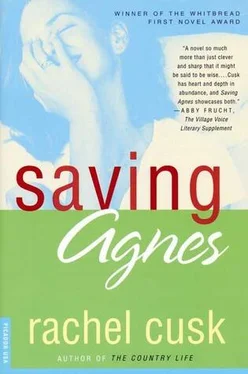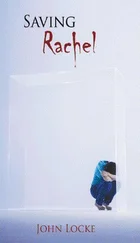‘But when is the end?’ Agnes wiped her nose on the back of her hand. ‘I mean, what’s to say things have to come right? I always believed there would be a point where I would definitely know if I was happy — when I would become myself, if you see what I mean, instead of just impersonating what I thought I should be. And now I feel as if I’ve suddenly woken up and things have gone by without me seeing them. They’ve just gone by in the night!’
‘That’s life,’ nodded her mother uncertainly.
‘But there must be more!’ she cried. ‘There must be more to this than life. There must be a point where things are infinite — where something is just infinitely sad, or where you’ve definitely failed, and who’s to say things will get better? Why should we be so sure of life, if we don’t even know what it is? Half of us are afraid to live, the other half are afraid to die! You’re right, we’re like children — we think we have to come top at life. But what happens if we just fail? Do we get expelled? Do we have to do detention?’
‘I felt as if I’d failed,’ interjected her mother, evidently recognising something of her own in the jumble of her daughter’s philosophical yard-sale. ‘When I had my miscarriage, before you were born, I felt as if I’d failed dreadfully.’
‘Did you?’ said Agnes, her tirade ambushed by the arrival of incontrovertable fact. ‘Why?’
Her mother’s face bore within its lines the imprint of other times, of feelings mapped out and revisited secretly, perhaps, by night. She was suddenly aware that she wanted her mother to have cared deeply, to have darkly nurtured a private grief. It might change things, like a magic trick. She would become a stranger with wounds. She might be able to shed new light on the situation.
‘We wanted that baby so much, you see. That little girl. It’s like that, you invest them with personality.’ She hugged her arms around herself. ‘It used to amaze me, feeling her move about. I would think, this tiny creature needs me like no one else does. You’ll know when it happens to you, it’s an extraordinary kind of love in those first months. So when she died I felt unimaginably guilty. She was so tiny and vulnerable and there was nothing I could do to help her. It seems ridiculous now, but I really blamed myself.’
‘But it wasn’t your fault!’ said Agnes.
‘That’s what I mean, dear. Things rarely are. And what I’ve been trying to say to you is that you have to go on, because as much as life knocks you down, really life is the only thing that can pick you up again. I couldn’t have known it then, but now I think, well, if that hadn’t happened, there wouldn’t have been room for Agnes. It all turned out for the best, because here you are.’
Agnes knew her debts were being called in. She could not but read an element of accusation in the tale. Things — indeed, whole lives! — had been sacrificed to bring her here, and what was she doing but criticising everything in sight? One could take nothing for granted. Even the ambiguous gift of her birth depended upon a miscarriage of justice. Her mother patted her hand comfortingly. Agnes felt as if she had drifted off to sleep halfway through a film, and had jolted back to consciousness, bleary-eyed, to find the plot had lurched forward and the characters taken on an unsettling air of mystery.
In the village churchyard, headstones jutted unevenly out of overgrown winter grass like mouldering, superfluous teeth. Agnes examined a few empty plots in the diffident manner of one comparing hotel rooms, noting their situation and aspect. One had to make provision for the future.
Perusing some of the grimier tablets, she found that they dated back as far as a hundred years or more. She wondered if anyone visited them now: people in bright tracksuits and shiny cars proudly displaying their ancestors to indifferent children, as if forbearance were something unusual. She lingered, sharing their silence. Patience was probably de rigueur for those under ground.
‘In Memory of Our Son Mark,’ read a newer one. ‘Who Died at the Age of Twenty-One.’ The implied tragedy drew her like a tabloid headline. Who was this Mark, cut down in his prime? Agnes leaned closer to examine the inscription. He had left loving memories, apparently; all his ends tied, his bills paid, his laundry clean and folded. What had he known to make him so prepared, leaving the neat equation of himself to be applied later to the incomprehensible fact of his absence? She could see them using it, those who had known him, figuring out the arithmetic of his imaginary life. Mark would be twenty-three by now, for instance; by now, Mark would perhaps be getting his first job; now Mark would say this and do that.
It couldn’t have been easy for him, remembering his future as well as his past. She herself would have botched the job, with the muddled, sprawling sum of her parts. If, for example, a piece of masonry from the church’s crumbling roof were now to fall upon her, her disappearance would leave an uncertain taste in the mouth. They would find dirty underwear, rent demands, unfinished arguments. People would come to the door asking for that ten pounds they had lent her, that apology she never gave, that explanation for herself she had promised. Things would come up. Her parents would grow terse and resentful. She would boil beneath their surface, spoiling things. Before long, her death would begin to lend life a guilty ease. There would be more room in the car. They could watch what they liked on television. Eventually they would murder the memory of her, scratching the uncomfortable itch of her lingering absence. Mark was unscratchable, it seemed; a bunch of burning nerve ends projecting himself like an amputated leg. He was good at it. She was half in love with him already.
Agnes ambled around the hard, mud-rutted path to the door of the church. It looked shut. She had used to go in sometimes when she was a child, loving its sanctuary, the dark womb and whale-belly. She loved its mouldy smell and dank air. It was the smell of history. It told her there had been other times; that these times, too, would pass. Now she was unsure about things. She wondered if it had a door policy, or opening hours, like a pub. She leaned on the weatherbeaten wooden slab, and found that it opened easily.
Inside, the church was cold and empty, and seemed somehow frozen in an attitude of suspended action; as if, a moment before, the wooden pews had been jiggling in the aisles, the candlesticks hopping on the altar, the stained-glass saints quaffing communion wine. There was about it an aspect of unsupervision which should have provoked anarchy.
Agnes’s feet echoed on the stone slabs of the floor as she approached the altar. It was covered with a cloth like something in a morgue. Before, when she was younger, she had come here to pray; or to complain, rather, presenting a list of woes and requests to the management as if there were some kind of democratic machinery in place to deal with them. Compensation! She had wanted compensation for daily disappointments and injustices. She had believed justice would be done! Agnes almost laughed aloud at the very thought of it. She would never have guessed that growing older was merely the process through which certainties became doubts. The grey areas grew larger, more amorphous. It showed around the eyes and over the hips: a gradual yielding to disappointment, a comfortable acceptance of pain. One acquired a glazed look. Indeed, had she not begun to see in herself the re-routed wires of fear, the concealed pipes and drains of desolation? She had hovered over bottles of shampoo in supermarkets, not knowing which one to buy, something fluttering in her eye like a tic, like an absence of want, like a malfunction of greed; wondered why she didn’t know, why she couldn’t choose, what else there could be if this wasn’t important!
Читать дальше












